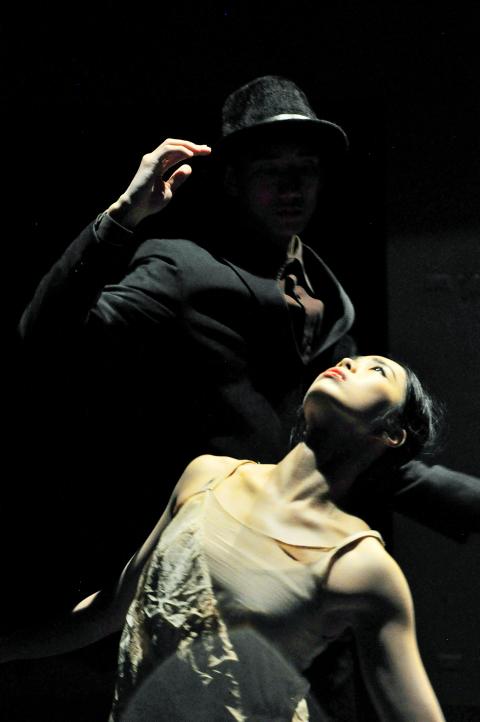The dance department at Taipei National University of the Arts (TNUA, 國立臺北藝術大學) should be feeling very pleased today, as its Focus Dance Company (焦點舞團) opens a sold out four-show run at the school’s dance theater tonight — something professional companies ofttimes only dream about.
While the Taipei run may be sold out, it is just the second stop in a seven-city nationwide tour that began in Yilan last week and will take the student dancers to Taichung, Jhongli, Kaohsiung, Tainan and Taitung over the course of several weekends next month and in May, so there are several chances to catch the nation’s up-and-coming stars if you are willing to travel.
The troupe’s artistic director, associate professor Zhang Xiao-xiong (張曉雄), has said there was a special reason for starting the tour in Yilan — it was the hometown of dancer/choreographer/TNUA professor Lo Man-fei (羅曼菲) who died nine years ago at 51.

Photo courtesy of Zhang Xiao-xiong
In addition to being a terrific performer in her own right, Lo encouraged and mentored scores of young Taiwanese dancers and choreographers, both at the school and through her work with Cloud Gate 2 (雲門2). She created the school’s unique seven-year dance program that brings students through three years of senior-high school and straight into the university for a bachelor’s degree.
One of Lo’s works, Shuttling (梭巡), was both the inspiration for the company’s tour and the final work on the two programs that the troupe is performing on this tour.
Another inspirational and mentoring dancer/choreographer/teacher is Helen Lai (黎海寧), the former artistic director of the Hong Kong City Contemporary Dance Company (城市當代舞蹈團). Her classic Plaza X is the other mainstay on the two programs, Plaza X (PLAZA X與異變街道).
There are seven works on each program, with the others choreographed by students.
Program A will include Reflection by Hsiao Yi-han (蕭翊涵) and Po Kai-huang’s (黃柏凱) Dependence (依附).
Program B includes Above the Dark River by Chi Hsuan-lin (林季萱), Hung Hsu’s (許辰) After the Cold (冷冽之後) and Nervous Difference (神經之差) by Amy Chang (張勤).
Program A will be performed in Jhongli, Tainan and Taitung, and Program B on the April 25 show in Kaohsiung.

As Taiwan’s second most populous city, Taichung looms large in the electoral map. Taiwanese political commentators describe it — along with neighboring Changhua County — as Taiwan’s “swing states” (搖擺州), which is a curious direct borrowing from American election terminology. In the early post-Martial Law era, Taichung was referred to as a “desert of democracy” because while the Democratic Progressive Party (DPP) was winning elections in the north and south, Taichung remained staunchly loyal to the Chinese Nationalist Party (KMT). That changed over time, but in both Changhua and Taichung, the DPP still suffers from a “one-term curse,” with the

Jan. 26 to Feb. 1 Nearly 90 years after it was last recorded, the Basay language was taught in a classroom for the first time in September last year. Over the following three months, students learned its sounds along with the customs and folktales of the Ketagalan people, who once spoke it across northern Taiwan. Although each Ketagalan settlement had its own language, Basay functioned as a common trade language. By the late 19th century, it had largely fallen out of daily use as speakers shifted to Hoklo (commonly known as Taiwanese), surviving only in fragments remembered by the elderly. In

William Liu (劉家君) moved to Kaohsiung from Nantou to live with his boyfriend Reg Hong (洪嘉佑). “In Nantou, people do not support gay rights at all and never even talk about it. Living here made me optimistic and made me realize how much I can express myself,” Liu tells the Taipei Times. Hong and his friend Cony Hsieh (謝昀希) are both active in several LGBT groups and organizations in Kaohsiung. They were among the people behind the city’s 16th Pride event in November last year, which gathered over 35,000 people. Along with others, they clearly see Kaohsiung as the nexus of LGBT rights.

Dissident artist Ai Weiwei’s (艾未未) famous return to the People’s Republic of China (PRC) has been overshadowed by the astonishing news of the latest arrests of senior military figures for “corruption,” but it is an interesting piece of news in its own right, though more for what Ai does not understand than for what he does. Ai simply lacks the reflective understanding that the loneliness and isolation he imagines are “European” are simply the joys of life as an expat. That goes both ways: “I love Taiwan!” say many still wet-behind-the-ears expats here, not realizing what they love is being an